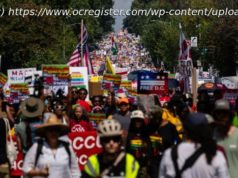Judge Kavanaugh voted in a number of high-profile cases to limit E. P. A. rules on issues like climate change and air pollution.
WASHINGTON — Long before President Trump nominated him for the Supreme Court on Monday, Judge Brett M. Kavanaugh had already made a name for himself as an influential conservative critic of sweeping environmental regulations.
During his 12 years on the United States Court of Appeals for the District of Columbia Circuit, often regarded as the nation’s second-most powerful court, Judge Kavanaugh voted in a number of high-profile cases to limit Environmental Protection Agency rules involving issues like climate change and air pollution. In two key instances, his arguments were later embraced by the Supreme Court.
His legal philosophy was clear: In the absence of explicit instructions from Congress, any far-reaching effort by the E. P. A. to tackle environmental problems should be met with deep skepticism by the courts. That philosophy often put him sharply at odds with the Obama administration, which sought to harness older environmental laws to deal with newer challenges like global warming.
“It’s a neutral principle, although the effect isn’t always neutral,” Richard J. Lazarus, a law professor at Harvard, said. “Congress stopped making clean air laws after 1990, so the E. P. A. has to work with increasingly tenuous statutory language. In effect, his approach to environmental law would make it harder to address current problems so long as Congress remains out of the lawmaking business.”
Judge Kavanaugh will have a chance to move the Supreme Court in a more conservative direction if the Senate confirms him to replace Justice Anthony M. Kennedy, who is retiring and who was often a moderate swing vote in big environmental cases.
The differences between Judge Kavanaugh and Justice Kennedy are particularly visible on climate policy. In 2007, Justice Kennedy voted with the Supreme Court’s four-member liberal wing in Massachusetts v. Environmental Protection Agency, giving the E. P. A. the authority under the Clean Air Act to regulate the greenhouse gases that cause global warming.
Congress had originally crafted that clean air law in the 1970s, before climate change had emerged as a major policy concern. But the Supreme Court ruled that greenhouse gases fit within the act’s “capacious definition of ‘air pollutant.’” In other words, the law was flexible enough to deal with problems that lawmakers hadn’t specifically anticipated at the time.
In subsequent cases, Judge Kavanaugh frequently resisted this line of thinking. In one 2012 case, a District of Columbia Circuit Court panel upheld a handful of early Obama-era greenhouse gas regulations. But Judge Kavanaugh vigorously dissented from the majority, arguing that the E. P. A. had “exceeded its statutory authority” and lacked explicit guidance from Congress.
“The task of dealing with global warming is urgent and important,” he wrote. But, he added, “As a court it is not our job to make policy choices,” and he went on to note that “E. P. A. went well beyond what Congress authorized” in crafting a greenhouse gas permitting program.
His reasoning ultimately persuaded the Supreme Court’s conservative justices, who later overruled the lower court and voted 5-4 to strike down parts of the E. P. A.’s permitting program that Judge Kavanaugh found troubling.
“I do believe the Supreme Court paid attention to Kavanaugh’s opinions on administrative law,” said Jonathan H. Adler, a law professor at Case Western University. “He lives and breathes this stuff, he’s been doing it for a long time, and that sort of experience matters when you’re dealing with complex regulatory issues.”
In other cases, however, Judge Kavanaugh went even further than the Supreme Court’s conservative wing was willing to go. In E. M. E. Homer City Generation v. Environmental Protection Agency, he wrote a majority opinion for the D. C. Circuit Court striking down a federal program to regulate air pollution that crossed state boundaries. The Supreme Court later took up the case and overruled him 6-2, with Justice Kennedy and Chief Justice John G. Roberts Jr. voting to uphold the pollution rule.
That case, along with several others, have led some legal experts to conclude that Judge Kavanaugh would, if confirmed, push the Supreme Court to be far more hostile to federal regulations. Such a shift could clear the way for the Trump administration to roll back Obama-era environmental policies in the coming years.
“It’ll be a very different court in the future,” said Robert Percival, a professor of environmental law at the University of Maryland. “Kennedy at least had an open mind on this issue, but if he’s replaced by Kavanaugh, it will really be hard times for environmental law for the rest of my lifetime.”
Other experts point out, however, that Judge Kavanaugh has not always reflexively voted against environmental regulations. In 2013, for instance, he voted to uphold a contentious E. P. A. decision to retroactively veto a West Virginia mining project. And in a 2014 opinion, Judge Kavanaugh ruled in favor of the Natural Resources Defense Council, an environmental group that had criticized an industry-friendly provision in a federal rule involving emissions from cement kilns.
“I can’t say environmental groups should be celebrating,” Mr. Lazarus said. But, he added, “I don’t think you can look at all these cases and say this is someone who is single-mindedly hostile toward environmental lawmaking.”
Home
United States
USA — Criminal How Brett Kavanaugh Could Reshape Environmental Law From the Supreme Court






